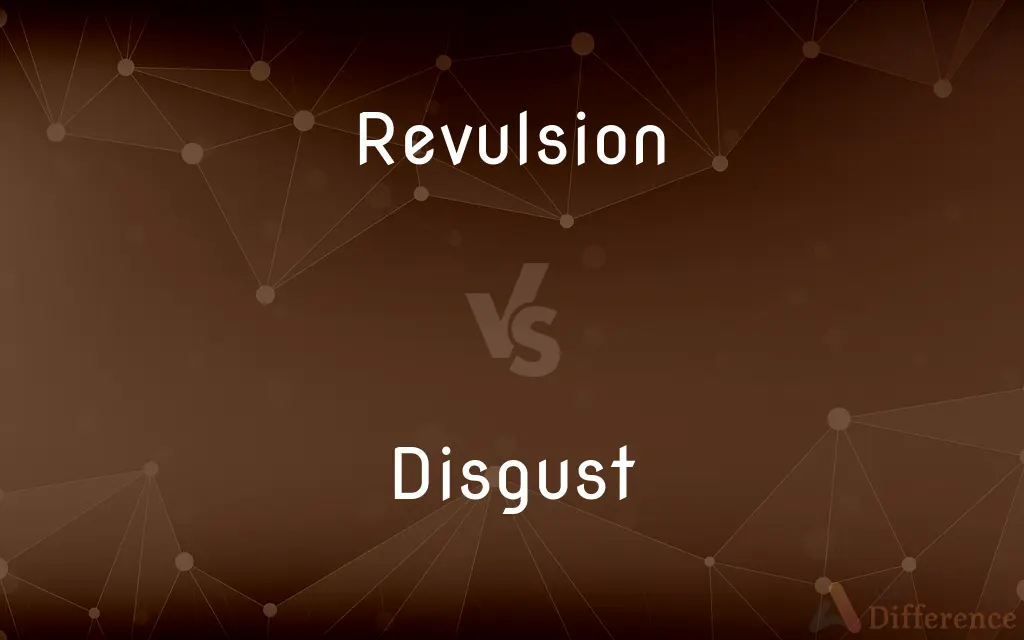Revulsion vs. Disgust — What's the Difference?

Difference Between Revulsion and Disgust
ADVERTISEMENT
Compare with Definitions
Revulsion
A sudden strong change or reaction in feeling, especially a feeling of violent disgust or loathing.
Disgust
Disgust (Middle French: desgouster, from Latin gustus, "taste") is an emotional response of rejection or revulsion to something potentially contagious or something considered offensive, distasteful, or unpleasant. In The Expression of the Emotions in Man and Animals, Charles Darwin wrote that disgust is a sensation that refers to something revolting.
Revulsion
(Archaic) A withdrawing or turning away from something.
Disgust
To excite nausea or loathing in; sicken.
Revulsion
(Medicine) The reduction of superficial inflammation in an affected body part, as by topical agents, in order to decrease inflammation in adjacent structures.
ADVERTISEMENT
Disgust
To offend the taste or moral sense of; repel.
Revulsion
Abhorrence, a sense of loathing, intense aversion, repugnance, repulsion, horror.
Disgust
Profound dislike or annoyance caused by something sickening or offensive.
Revulsion
A sudden violent feeling of disgust.
Disgust
To cause an intense dislike for something.
It disgusts me to see her chew with her mouth open.
Revulsion
(medicine) The treatment of one diseased area by acting elsewhere; counterirritation.
Disgust
An intense dislike or loathing someone feels for something bad or nasty.
With an air of disgust, she stormed out of the room.
Revulsion
(obsolete) A strong pulling or drawing back; withdrawal.
Disgust
To provoke disgust or strong distaste in; to cause (any one) loathing, as of the stomach; to excite aversion in; to offend the moral taste of; - often with at, with, or by.
To disgust him with the world and its vanities.
Ærius is expressly declared . . . to have been disgusted at failing.
Alarmed and disgusted by the proceedings of the convention.
Revulsion
(obsolete) A sudden reaction; a sudden and complete change of the feelings.
Disgust
Repugnance to what is offensive; aversion or displeasure produced by something loathsome; loathing; strong distaste; - said primarily of the sickening opposition felt for anything which offends the physical organs of taste; now rather of the analogous repugnance excited by anything extremely unpleasant to the moral taste or higher sensibilities of our nature; as, an act of cruelty may excite disgust.
The manner of doing is more consequence than the thing done, and upon that depends the satisfaction or disgust wherewith it is received.
In a vulgar hack writer such oddities would have excited only disgust.
Revulsion
A strong pulling or drawing back; withdrawal.
Disgust
Strong feelings of dislike
Revulsion
A sudden reaction; a sudden and complete change; - applied to the feelings.
A sudden and violent revulsion of feeling, both in the Parliament and the country, followed.
Disgust
Fill with distaste;
This spoilt food disgusts me
Revulsion
The act of turning or diverting any disease from one part of the body to another. It resembles derivation, but is usually applied to a more active form of counter irritation.
Disgust
Cause aversion in; offend the moral sense of;
The pornographic pictures sickened us
Revulsion
Intense aversion
Share Your Discovery

Previous Comparison
Slipper vs. Sleeper
Next Comparison
Subject vs. Major













































